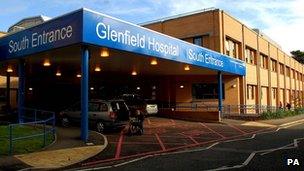Glenfield Hospital: NHS 'ignored' data in child heart ops review
- Published

Glenfield Hospital's mortality rate in children's heart surgery is the country's best
Figures which show an under-threat children's heart unit has the lowest mortality rate in the country have been ignored, a leading health expert says.
The NHS wants to close Glenfield Hospital's unit as part of plans to overhaul the service nationally.
Professor Sir Brian Jarman from Imperial College said there were only five deaths at the unit in the past six years - much fewer than expected.
The NHS said the mortality data focused on too few patients to be meaningful.
In July, the Joint Committee of Primary Care Trusts (JCPCT) said the facility in Leicester should be one of three to close nationally.
The JCPCT said creating fewer, larger centres would improve the service, and that the unit, along with the Ecmo (extracorporeal membrane oxygenation) equipment used to oxygenate patients' blood, should go to Birmingham.
But Prof Jarman's figures, external show Glenfield Hospital had the lowest expected mortality rate of all 11 of the children's heart centres he analysed.
He looked at the number of open heart operations, excluding transplants, between March 2006 and March 2012 - comparing the number of deaths with the expected figure.
A hospital which had exactly the expected number would have a standardised mortality rate (SMR) of 100, but because Glenfield had fewer deaths and scored 45.1.
By comparison, Birmingham's SMR was 109.8 and Great Ormond Street was 72.8. The JCPCT has recommended that both those units remain open.
'Very pleased'
Edward Garnier, MP for Market Harborough, has backed the campaign to save Glenfield's centre.
Speaking on BBC Leicester he said: "It strikes me this is a no-brainer. This is a hospital which saves people's lives and to shut it down is simply absurd."
Giles Peek, head of Glenfield's children's heart unit, said: "Of course we are very pleased to be at the top of the table rather than the bottom but we must interpret this data carefully because it is not as simple as a league table in football for instance.
"Of course Professor Sir Brian Jarman is an extremely experienced medical statistician and he understands those limitations."
He added: "What you want at the end of the day as a parent is a live baby who has had good care."
Prof Jarman said: "I have put out this data mainly because I feel it should be in the public domain so it is available to parents.
"I thought they should have the data to inform the decision on which unit to close."
But the group which led the review into the centres defended its decision not to use the data in its original decision.
Leslie Hamilton, deputy chair of the safe and sustainable steering group, said: "The available data is not useful because it refers to a very small number of patients.
"Caseloads at individual units are too low to make meaningful comparisons across hospitals and a significant number of procedures are not included in the validated data available.
"Furthermore the data provides no reliable way of reflecting case complexity, disadvantaging units that regularly perform more high-risk surgical procedures."
The former Secretary of State for Health Jeremy Hunt asked the independent reconfiguration panel (IRP) to look at how the recommendations were reached.
It is expected to report its findings by 28 February.
- Published24 October 2012
- Published23 October 2012
- Published22 October 2012